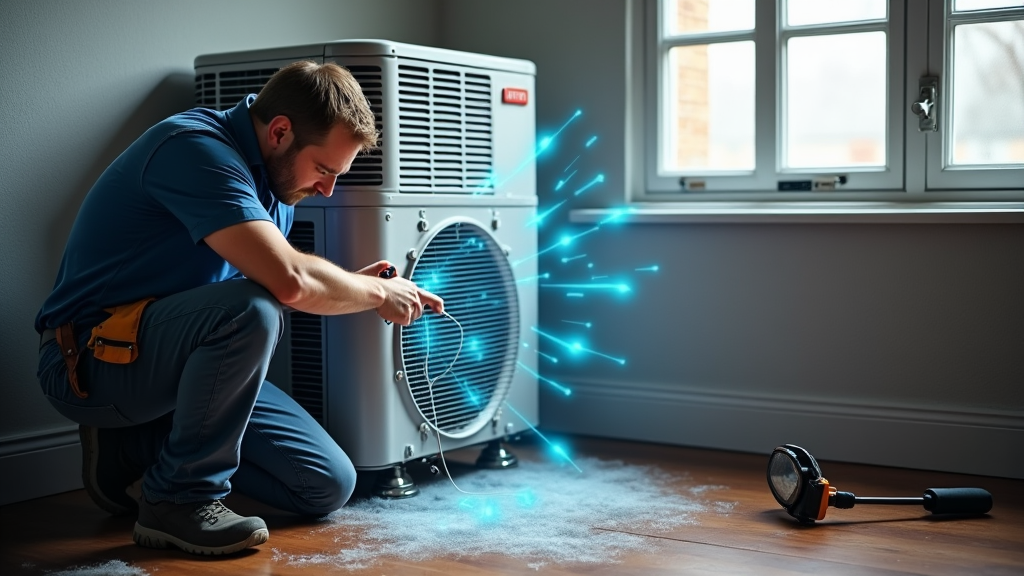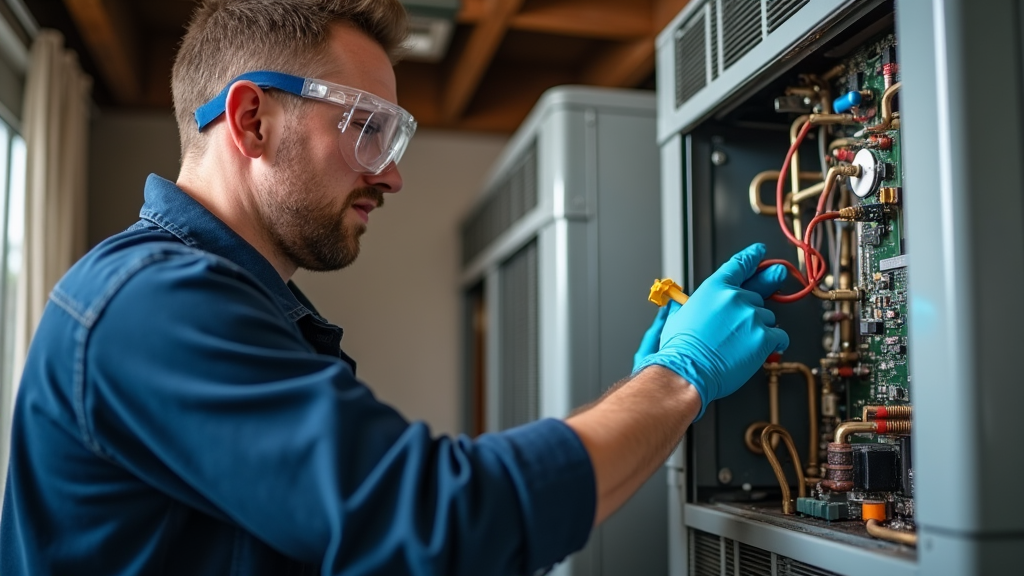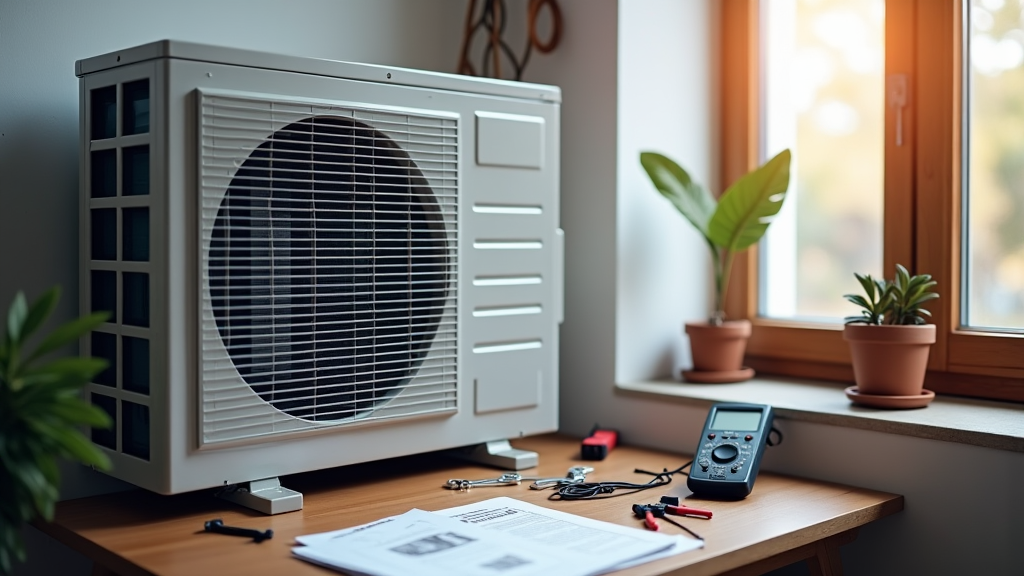Heat pump repair is crucial for maintaining your home’s comfort levels. If your heat pump system is not working right, it can make your home too hot or too cold. Knowing when to get help can save you from bigger problems later. Let’s dive into everything you need to know about heat pump repair.
A heat pump is a system that moves heat from one place to another. It can heat your home in winter and cool it in summer. Unlike traditional heating, it uses electricity more efficiently. In Fort Worth, heat pumps are popular because they can handle both hot summers and chilly winters. You can choose between an air source heat pump or a ground source heat pump, depending on your needs and budget. When selecting a system, consider the seasonal energy efficiency ratio (SEER), which measures how efficiently a heat pump operates over a season.
Heat pumps use a refrigerant to transfer heat. In cooling mode, they take heat from your home and release it outside. In heating mode, they do the opposite. This makes them flexible and energy-efficient, which is great for saving money on energy bills. Whether you have a ductless heat pump or a split system, understanding how your heat pump technology works is key to effective climate control and system optimization. Many heat pump brands offer various features that enhance performance, so it’s worth researching options that fit your needs.
| Issue | Description | Possible Causes | Recommended Action |
|---|---|---|---|
| Strange Noises | Unusual sounds like clanking or buzzing | Loose parts or malfunctioning components | Schedule a repair service |
| Inconsistent Temperatures | Rooms have varying temperatures | Blocked ducts or unit issues | Inspect ductwork and unit |
| Increased Energy Bills | Higher bills without increased usage | Dirt buildup or mechanical issues | Schedule maintenance |
| Freezing Up | Ice formation on the heat pump | Blocked airflow | Clear obstructions and call a technician |

Knowing the signs that your heat pump needs repair is essential. Here are several common symptoms to watch out for:
If your heat pump starts making strange noises, it’s a sign something may be wrong. Sounds like clanking, buzzing, or rattling can indicate loose parts or malfunctioning components. This could also mean issues with the compressor, which is vital for your system’s performance. Noise issues can often signal that your heat pump is struggling, so don’t ignore them.
When some rooms are too hot and others too cold, your heat pump may not be working correctly. This problem can come from blocked ducts or issues with the unit itself. Troubleshooting these heat pump issues early can help you avoid costly repairs. A ductless heat pump can sometimes help with this issue by providing targeted heating and cooling. This is especially useful for zone heating, which allows you to control temperatures in different areas of your home.
If you notice your energy bills rising without any change in usage, your heat pump may be working harder than it should. This can happen due to dirt buildup or mechanical issues. It’s important to check for error codes on your thermostat, as they can indicate specific problems. Keeping an eye on your energy bills can help you catch issues early. If you find that your bills are unusually high, it may be time for a system upgrade to improve heat pump efficiency. High-efficiency models can save you money in the long run and contribute to energy performance. Consider getting an energy audit to identify areas where you can improve efficiency.
Short cycling means your heat pump turns on and off too quickly. This can cause wear and tear on your system, leading to more serious problems. A system check can help identify if the thermostat is malfunctioning or if there are issues with the compressor. This is especially important for split systems, which can be sensitive to short cycling. If you notice this happening, it could lead to heat pump failures if not addressed.
If you see ice forming on your heat pump, this is a red flag. Ice can block airflow and cause your system to fail completely. This often happens due to blocked airflow, so troubleshooting the area around your outdoor unit is essential. If you notice this issue, it may require emergency services to prevent further damage. Frozen coils can lead to significant problems, so act quickly.

Different issues can affect your heat pump’s performance. Here are some of the most common repair needs:
Clogged air filters can block airflow. This makes your heat pump work harder to heat or cool your home. Regular filter replacement is essential for good performance. A dirty filter can lead to increased costs and reduced efficiency. This is especially important for maintaining good indoor air quality and proper ventilation.
Refrigerant is the fluid that helps move heat. If there’s a leak, your heat pump can’t operate properly. This can lead to poor heating or cooling and higher energy costs. If you suspect a refrigerant leak, call for professional repair services right away.
The electrical components in your heat pump can wear out over time. Issues like faulty wiring can cause your system to stop working or behave erratically. A system performance audit by a certified technician can help identify these issues before they become major problems.
A malfunctioning thermostat can lead to incorrect temperature readings. This can cause your heat pump to run inefficiently or not at all. If you notice your thermostat displaying error codes, it may need to be repaired or replaced.
 Routine maintenance can prevent many heat pump issues. Here are some simple tips to keep your system running smoothly:
Routine maintenance can prevent many heat pump issues. Here are some simple tips to keep your system running smoothly:
Check your air filters monthly. Change them every one to three months, depending on usage. Clean filters help airflow and efficiency. This simple task can save you money on energy costs and improve indoor air quality.
Keep the area around your outdoor unit clear of leaves, dirt, and other debris. This helps prevent blockages that can affect performance. A clean unit can operate more efficiently, reducing your overall costs.
Having a professional check your heat pump at least once a year is important. They can spot problems early and keep your system in good shape. Regular yearly inspections can help you avoid major repairs and keep your costs down. Make sure to ask about any warranty options available for the services provided. Consider signing up for service agreements that include regular check-ups and discounts on repairs.
If your heat pump has ductwork, make sure it’s clean and not blocked. Dirty ducts can reduce airflow and efficiency. This can lead to increased energy bills and poor performance. Regular ductwork inspections can help maintain your system’s efficiency.
When you call for help, here’s what you can expect during a heat pump repair service:
A technician will start by inspecting your heat pump. They will listen for strange noises and check the system for any visible issues. They may also check for error codes on your thermostat. This is part of the system diagnostics process to ensure everything is functioning properly.
After the inspection, they will diagnose the problem. They may need to test different components, including the compressor and electrical systems, to find the cause of the issue. This performance testing is crucial for identifying any underlying problems.
Once they know what’s wrong, the technician will explain your repair options. They will give you an estimate for the work needed. Understanding the cost of repairs can help you make informed decisions. Be sure to check customer reviews to find a reliable service provider. High customer satisfaction is often a good indicator of quality service.
After you agree to the repairs, the technician will complete the work. They will test your heat pump to ensure it’s working properly before they leave. A final system check will confirm that everything is functioning as it should.
Selecting the right company for your heat pump repair is important. Here are some tips to help you choose:
Choose a company that has experience with heat pumps. They will be familiar with common problems and repair techniques. An experienced technician can quickly troubleshoot issues and provide effective solutions. Look for repair technicians who have a good track record in the Fort Worth area.
Reading customer reviews can give you insight into a company’s reliability and quality of work. Look for companies with positive feedback. This can help you find a trusted professional service in your area.
Make sure the company is licensed and insured. This protects you in case of accidents or issues during the repair. A licensed technician will also be more knowledgeable about the latest technology and best practices.
Don’t hesitate to get estimates from several companies. This helps you find a fair price for the repair work. Understanding the installation cost upfront can help you budget for necessary repairs.
Consider signing up for maintenance plans offered by HVAC companies. These can provide regular check-ups and discounts on repairs. A good maintenance plan can save you money in the long run. Regular preventive maintenance can also help with system optimization.
Regular maintenance is key to keeping your heat pump running well. Here’s why it matters:
With proper care, your heat pump can last longer. Routine checks and repairs can help avoid major issues down the line. This can save you money on replacement costs.
A well-maintained heat pump runs more efficiently. This can lead to lower energy bills and a more comfortable home. Regular maintenance helps ensure your system performs at its best.
When you keep up with maintenance, you will likely face fewer major repairs. This saves you time and money in the long run. A proactive approach can help you avoid unexpected costs.
Many homeowners in Fort Worth want to save money on energy bills. Here are some ways your heat pump can help:
When buying a heat pump, look for the seasonal energy efficiency ratio (SEER) rating. A higher SEER means better energy efficiency. This can lead to lower costs over time. High-efficiency models are often worth the investment.
Installing a smart thermostat can help you manage your heat pump. It can adjust the temperature based on your schedule, saving energy. This can improve your system’s performance and reduce energy bills. Smart thermostats can also help with load calculations, ensuring your system is not overworked. Look for models that offer programmable settings for added convenience.
Good home insulation helps keep the temperatures in your home stable. Make sure your home is well-insulated to maximize your heat pump’s efficiency. Proper insulation can also reduce the workload on your system. This is a key part of energy-efficient heating.
While it’s always best to call a professional for major repairs, here are some DIY tips for minor issues:
Sometimes, the thermostat may be set incorrectly. Make sure it’s on the right setting and that the temperature is set correctly. If you see error codes, consult the manual for troubleshooting steps. If your thermostat has remote control features, use them to adjust settings easily.
As mentioned earlier, changing air filters is a simple task you can do yourself. This can improve airflow and efficiency. A clean filter can help your heat pump perform better. Regular filter replacement is essential for maintaining good air quality.
Take time to clear leaves and debris around your outdoor unit. Keeping the area clear helps with airflow and performance. This simple step can prevent costly repairs.
You can check your ducts for any visible blockages. If you see dirt or debris, consider cleaning them to improve airflow. Clean ducts can enhance your system’s performance and efficiency. Addressing airflow issues early can save you from bigger problems later.
If you notice any of the following, it’s time to call a professional:
If your heat pump starts making loud or unusual noises, this is a sign you need help. A technician can troubleshoot the issue and check the compressor and other components. Noise issues can indicate serious problems that need immediate attention.
If your heat pump is not heating or cooling effectively, don’t wait. Call for a repair as soon as possible. A quick response can prevent further damage and higher costs.
If your energy bills suddenly spike, it could mean your heat pump is not working efficiently. A technician can help identify the issue and recommend solutions.
If you find yourself calling for repairs often, it may be time to consider repairs vs. replacement. Frequent issues can indicate that your system is nearing the end of its heat pump lifespan. This is especially true if you are dealing with frozen coils or other recurring problems.
| Tip | Benefits | Frequency |
|---|---|---|
| Change Thermostat Batteries | Ensures accurate temperature control | Every 6 months |
| Clean Outside Unit | Prevents dirt buildup and improves airflow | Monthly |
| Inspect Ductwork | Reduces allergens and improves efficiency | Yearly |
By following these tips and understanding your heat pump, you can ensure it runs efficiently. Regular maintenance and timely repairs can help you enjoy a comfortable home while saving on energy costs. Consider local HVAC services in Fort Worth for expert help and advice on home energy solutions that fit your needs.
At Prestige Air, we’re a team full of passionate heating and air conditioning technicians who care deeply about our clients. We know that issues with your heating and cooling can be a headache and our goal is to get your issues resolved ASAP so you can get back to living your life stress-free.
Contact us using the form below or feel free to call us directly at (817) 200-7215. We’d love the opportunity to serve you!